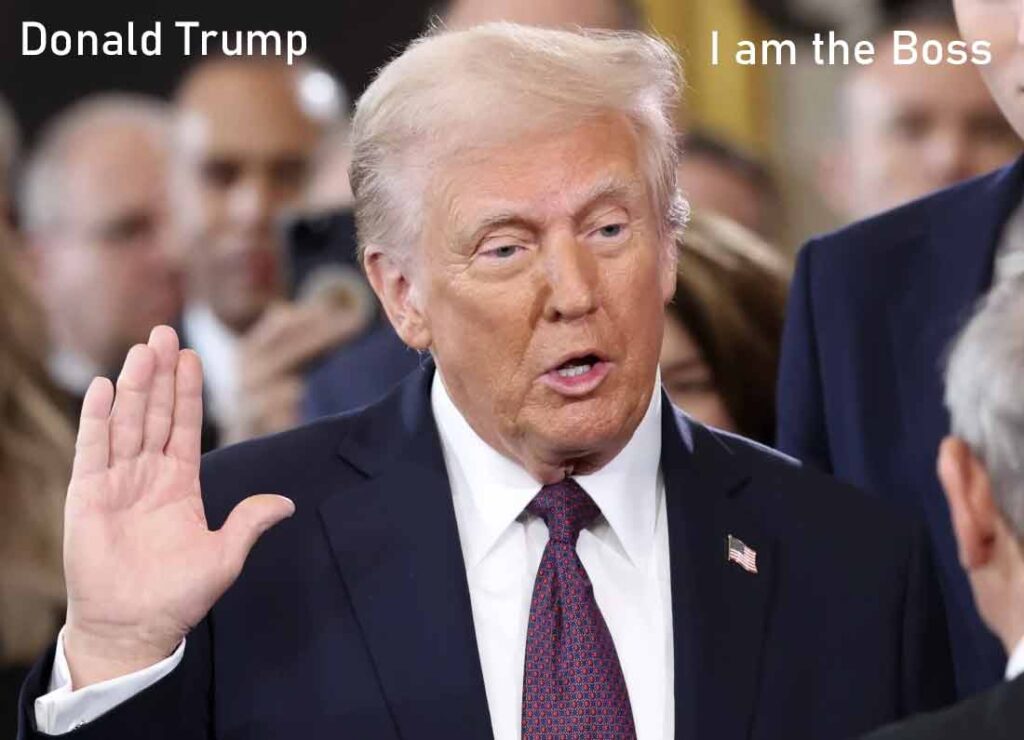Introduction
On January 20, 2025, Donald J. Trump took the oath of office as the 47th President of the United States, marking a significant moment in U.S. political history. This second, non-consecutive term comes amid polarized public sentiment and shifting global dynamics. Trump’s return to the White House has sparked discussions about its potential impact on national and international policies, the economy, immigration, trade, and societal values. This article delves into the implications of Trump’s inauguration, analyzing his policy announcements, their advantages and disadvantages, and their effects on various sectors.
Trump’s Inaugural Address
President Trump’s inaugural address set the tone for his administration’s goals and priorities. He reiterated his commitment to the “America First” doctrine, promising to prioritize American interests in economic, political, and security matters. Trump emphasized restoring national sovereignty, revitalizing the economy, and strengthening border security. His speech highlighted a vision of renewed American greatness, underscored by self-reliance and robust patriotism.
Key points from his speech included:
- A pledge to secure the southern border and combat illegal immigration.
- Promises to reduce U.S. reliance on foreign energy through increased domestic production.
- A call to restore traditional values, including recognizing only two genders in federal policies.
- An emphasis on renegotiating international trade deals to favor American workers and industries.
National Impact
Immigration Policies
One of President Trump’s first actions was to declare a national emergency at the U.S.-Mexico border, signaling a renewed focus on stringent immigration control. His administration announced plans to:
- Terminate the CBP One app – A tool used to facilitate legal entry applications for asylum seekers.
- Designate Mexican cartels as terrorist organizations – Allowing for more aggressive measures to combat drug trafficking and related violence.
- Increase border wall construction – A continuation of his earlier efforts to fortify physical barriers along the southern border.
Advantages:
- Enhanced border security aims to curb illegal immigration and reduce associated crimes.
- Redirecting resources to enforce immigration laws could streamline legal immigration processes.
- Protecting American jobs by reducing unauthorized labor competition.
Disadvantages:
- Stricter policies may face legal challenges and opposition from human rights organizations.
- Potential labor shortages in industries heavily reliant on immigrant workers, such as agriculture and construction.
- Strained diplomatic relations with neighboring countries, particularly Mexico.
Economic Policies
President Trump’s economic agenda centers on boosting domestic production and reducing reliance on foreign imports. His proposed measures include:
- Implementing new tariffs: Designed to protect American manufacturers from foreign competition.
- Increasing energy independence: Expanding drilling and fracking operations to lower energy costs and create jobs.
- Rolling back environmental regulations: Simplifying compliance requirements for businesses.
Advantages:
- Potential growth in manufacturing jobs and domestic industries.
- Lower energy costs for consumers and businesses.
- Strengthening the U.S. economy by reducing trade deficits.
Disadvantages:
- Tariffs may lead to retaliatory measures, increasing costs for imported goods.
- Environmental deregulation could have long-term ecological consequences.
- Rising production costs in certain industries due to increased reliance on domestic resources.
International Impact
Diplomatic Relations
Trump’s “America First” policy is likely to influence diplomatic ties, particularly with traditional allies and global competitors. Key areas of focus include:
- NATO and Defense Alliances: Trump has previously criticized NATO members for insufficient defense spending. His administration may push for greater financial contributions from allied nations.
- China Relations: Expect a continuation of the trade war, with tariffs and restrictions aimed at countering China’s economic influence.
- Middle East Policy: Support for Israel and renewed pressure on Iran to abandon nuclear ambitions.
Advantages:
- Strengthened national security through renegotiated alliances.
- Greater leverage in trade deals by focusing on bilateral agreements.
Disadvantages:
- Risk of alienating key allies, potentially reducing U.S. influence on global issues.
- Escalation of trade disputes could harm global economic stability.
Trade Policies
Trump’s administration aims to overhaul existing trade agreements to favor American workers. This includes renegotiating terms of deals such as the USMCA and imposing tariffs on goods from nations with perceived unfair trade practices.
Advantages:
- Promotes domestic job creation by incentivizing local production.
- Reduces dependency on foreign imports, bolstering economic resilience.
Disadvantages:
- Tariff wars may increase consumer prices and reduce export competitiveness.
- Disruption of global supply chains could impact U.S.-based multinational corporations.
Societal Values and Policies
Gender Recognition
President Trump’s policy to recognize only two genders in federal programs marks a shift from previous administrations’ inclusive approaches. This decision will influence regulations in areas such as healthcare, education, and workplace protections.
Advantages:
- Simplifies regulatory frameworks by adhering to traditional definitions.
- Aligns with the values of certain conservative groups.
Disadvantages:
- Excludes non-binary and transgender individuals, potentially leading to discrimination.
- Legal challenges from advocacy groups could create prolonged policy disputes.
Environmental Policies
Trump’s administration plans to roll back key environmental initiatives, including the Green New Deal. The focus will shift to traditional energy sources like coal and natural gas.
Advantages:
- Lower compliance costs for energy companies.
- Job creation in traditional energy sectors.
Disadvantages:
- Increased greenhouse gas emissions and environmental degradation.
- Reduced global leadership on climate change initiatives.
Stock Market Impact
The stock market’s reaction to Trump’s inauguration and policies will depend on investor confidence in economic stability and growth prospects. Key factors include:
- Pro-business policies: Lower taxes and deregulation may boost corporate profits and stock prices.
- Tariff risks: Trade disputes could create market volatility.
- Energy policies: Increased domestic production may favor energy stocks but hurt renewable energy sectors.
Conclusion
Donald Trump’s return to the presidency signifies a pivotal moment for the United States. His “America First” agenda, while appealing to his base, presents both opportunities and challenges. Nationally, his policies aim to strengthen border security, revitalize the economy, and restore traditional values. Internationally, his approach may reshape alliances and trade dynamics. The coming years will reveal the effectiveness of these measures and their long-term impact on American society and the global community

